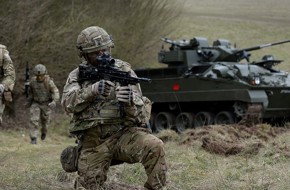Highlights
- Moving their career service online - introducing a new Careers Management Portal supporting a wider Sustainable MoD Strategy.
- Reducing their carbon footprint, with substantial financial savings also secured, through travel reduction and remote working.
- Quantifying environmental and cost savings from different work practices.
- Supporting Scottish Government’s response to the pandemic.

The Glasgow based Army Personnel Centre (APC) is part of the Ministry of Defence (MoD) and is responsible for the career management of all personnel in the Army. They ensure the right person with the correct skills, knowledge and experience is matched with the right career path throughout the Army. This is achieved through Boarding processes, broken down into specific types of Board: Grading Boards; Promotion Boards; and Appointment Boards.
In response to the COVID-19 pandemic and subsequent lockdown, new ways of working have been introduced. Previously, over 1000 permanent centre office staff travelled to the centre, some from significant distances, and personnel were required to travel from all over the UK for Boards. Expenses were incurred for hotels, meal allowance and travel/car hire, including flights and trains. The career record management system was paper based, labour and resource intensive with reports printed off for every candidate for every Board.
Working practices changed in Spring 2020 to adapt to home working and allow access to a new electronic Career Management Portal. This new way of working supports the Sustainable MoD Strategy - Act and Evolve 2015 – 2020. The changes will benefit the organisation and community by generating savings and reducing their carbon footprint.
Permanent staff can now work remotely and are not required to travel to Glasgow, reducing the number of car journeys, carbon emissions, fuel consumption, and footfall on public transport. A study was carried out by Army HQ which predicted for 2020/21 a saving of £1.2 million (travel and subsistence (flights, trains and hotels)), 4042 travel hours and 715 tonnes of CO2.
The electronic record system significantly reduces the use of paper; it is predicted to save an estimated £41,130 and 7050 administrative hours for 2020/21. There will also be significant associated carbon savings.
As the office will be used less, there will be less water, gas and electricity consumed. Water in the ablutions and refreshment areas, gas providing hot water and heating, electricity saved in lighting, powering PCs and through the reduction of printing.
The Defence Infrastructure Organisation (DIO) calculated that these reductions amount to 169 tonnes of CO2 saved, and a saving of £40,714 between 1 April and 31 August 2020 on the cost of gas and electricity. £14,910 was saved in water between 1 April and 30 June 2020.
To enable staff to work remotely, additional resources were provided including laptops. Where there was not capacity to issue a laptop, access was provided to the military online portal Defence Gateway. This allowed staff to work from home on a military platform accessed through their personal devices. Both measures allowed the APC to conduct business as usual through the pandemic. A number of APC staff have also been working in conjunction with the Scottish Government, supporting the work and decision-making processes being conducted during the pandemic, providing expertise in specialist areas.